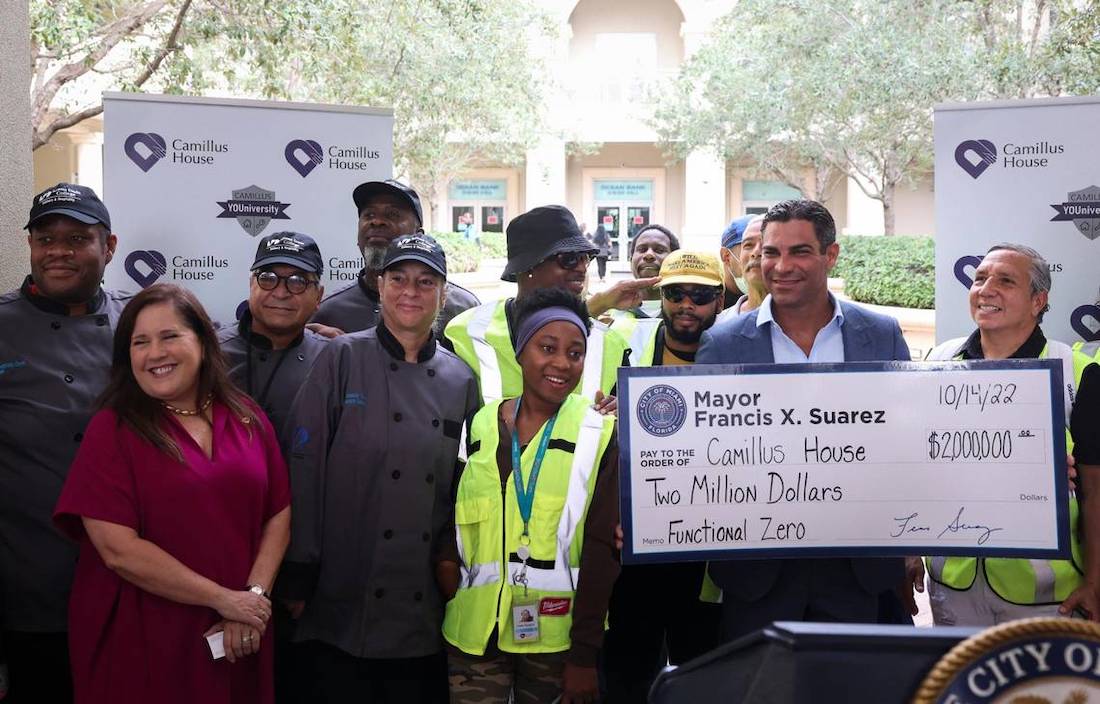Miami invests $2M in Camillus House to drop the number of homeless to ‘functional zero’
By Howard Cohen and Joey Flechas for the MIAMI HERALD


Miami gave the Camillus House shelter $2 million as part of a broader program to reduce homelessness.
Miami Mayor Francis Suarez announced the donation Friday at the shelter at 1603 NW Seventh Ave. The contribution is part of a funding blitz Suarez sponsored to bring the number of people experiencing homelessness down to “functional zero.”
“Cities are judged on how they treat the least of their brothers and sisters,” Suarez told reporters at the presentation.
Almost half of the funding — $800,000 — is earmarked to continue partnerships with Miami Dade College and Florida International University to provide on-site culinary arts, hotel maintenance, construction trades and forklift operator training classes, said Camillus House CEO Hilda Fernandez.
Once participants finish one of those courses, they earn certifications sought after by employers, Fernandez said.
According to Camillus, the other $1.2 million will go toward projects such as a $400,000 funding of an expansion of the Lazarus/Matt Talbot specialized outreach program that targets the chronic mentally ill homeless and those with severe and persistent substance abuse issues. Partners include Hermanos de la Calle.
Funds, about $320,000, will also go toward placing trained case managers with the regular street outreach teams to prepare the documentation needed to move homeless people on the street who are shelter-resistant but ready for housing, directly into apartments.
Fueling that part of the effort would offer those experiencing homelessness, “treatment and case management before and after housing placement, providing for some expanded emergency housing, and enhancing the Camillus YOUniversity Life Skills program,” Fernandez said in an email to the Miami Herald.
Also, about $127,750 is for funding the City of Miami Police HEAT Team — Specialized Police Homeless Unit — with emergency beds to immediately assist people and provide an alternative to arrest with placement at Camillus.
According to Camillus, these people could then transfer into other city-funded beds at Camillus so they can participate in other services that could lead the way to permanent housing.
COMMUNITY REACTION
Miami City Commissioners Ken Russell and Manolo Reyes joined Mayor Suarez during the announcement. Fernandez and Paul Lowenthal, chairman of Camillus’ board of directors, were at the presentation.
“If we were to describe this impact of this funding in one word it would be transformational,” Fernandez said. “After 62 years of serving the poor, hungry and homeless in Miami, we know that helping the homeless requires a combination of resources to not only address the immediate needs of food and shelter, but to reach the ultimate goal of helping those we serve once again live independently, safely housed and as contributing members of this community.”
To achieve goals like this as Miami has grown considerably takes partnerships, Fernandez said.
“Our community’s success in addressing the homeless issue these past 25-plus years, especially as compared to other large urban metro areas, was the result of partnerships between the public and private/nonprofit sector. The city of Miami is also our home, and as one of the largest and certainly most comprehensive providers of housing and services, we are proud to partner with the city to address the immediate needs of the homeless in our city, as well as provide the long-term solutions to help move them into safe, stable housing,” Fernandez said.
OTHER DONATIONS TO HELP STRUGGLING PEOPLE
The $2 million contribution is the latest in a string of city grants funded by federal pandemic relief dollars.
The mayor, who is considering a White House bid based in part on his record in Miami, has held several news conferences to announce donations that were first approved by the City Commission in January.
In August, the city of Miami donated $200,000 to Lotus Village, the nation’s largest shelter dedicated to women and children, for job training programs.
The money for that investment came from the larger $3.1 million allocation of federal funds by the city government toward programs to help people experiencing homelessness.
Howard Cohen: 305-376-3619, @HowardCohen
Joey Flechas: 305-376-3602, @joeflech
This story was originally published by the Miami Herald

Sweetwater Fl, 33172
1-800-843-4372
President: Nancy A. Meyer
Executive Editor: Monica Richardson
VP of Advertising: Orlando Comas
2020 Digital Traffic
Mo. Unique Visitors: 10,797,000 (December 2020)
Avg. Mo. Page Views: 40,090,000 (2020)
2020 Print Circulation
Daily: 73,181
Sunday: 100,598

